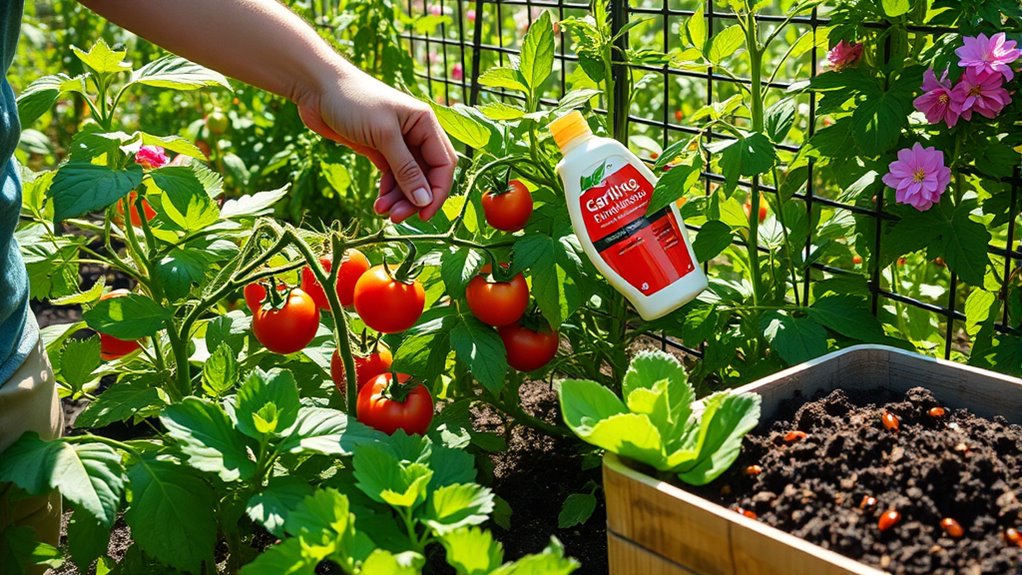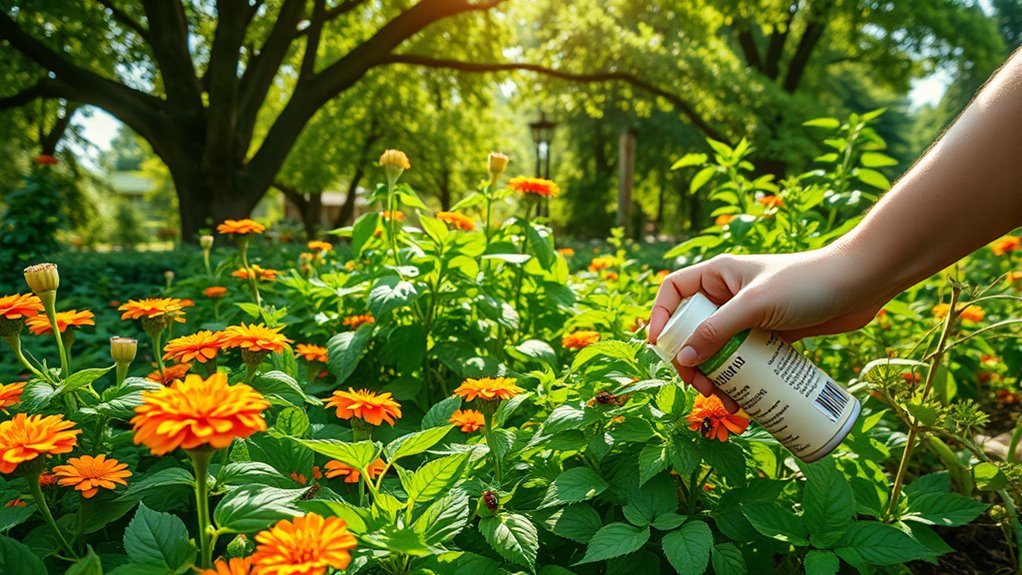To control pests organically, try companion planting by growing marigolds or basil near your vegetables to repel insects. Use homemade sprays with garlic, hot peppers, or neem oil to deter pests naturally. Attract beneficial insects like ladybugs and lacewings by planting flowers, and regularly inspect your garden for early signs of trouble. Staying proactive with these eco-friendly methods can help keep your garden healthy; keep exploring for more tips to boost your pest control strategy.
Key Takeaways
- Implement companion planting with herbs like basil and marigolds to naturally repel pests.
- Use homemade organic sprays with garlic, hot peppers, or neem oil to deter unwanted insects.
- Attract beneficial insects such as ladybugs and lacewings to control pest populations naturally.
- Conduct regular garden inspections to detect pests early and apply targeted organic interventions.
- Promote garden diversity and ecosystem resilience to reduce pest attraction and minimize chemical use.

Organic pest control methods offer a safe and environmentally friendly way to protect your garden from unwanted pests. One effective technique you can try is companion planting, which involves growing certain plants together to naturally deter pests. For example, planting marigolds alongside vegetables like tomatoes or peppers can help repel nematodes and aphids. Basil planted near tomatoes not only enhances flavor but also wards off thrips and flies. This method works because many plants emit specific scents or chemicals that confuse pests or mask the scent of your valuable crops, making it harder for them to locate their preferred hosts.
Alongside companion planting, utilizing natural repellents can further decrease pest problems. Natural repellents include homemade sprays or commercially available organic options that are safe for your plants and the environment. You can make your own repellent by mixing garlic, hot peppers, and neem oil into water, then spraying it on your plants. The strong smell and taste of these ingredients deter a variety of pests, including beetles, caterpillars, and aphids. Applying natural repellents regularly creates a protective barrier around your plants, reducing the likelihood of infestations before they become serious. Incorporating organic pest control methods like biological controls can enhance your garden’s resilience against pests. Additionally, choosing appropriate gardening tools can help you manage pests more efficiently and reduce plant stress.
Another key aspect of organic pest control is understanding the importance of diversity in your garden. A diverse plant selection attracts beneficial insects like ladybugs, lacewings, and parasitic wasps. These natural predators help keep pest populations in check without the need for chemical interventions. By creating a balanced ecosystem, you foster a natural pest control system that requires less maintenance over time. Incorporate flowering plants that attract these helpful insects, and avoid monoculture planting, which can make your garden more attractive to pests. Additionally, using companion planting strategically can help you reduce reliance on external pest management inputs, fostering a healthier garden environment.
Monitoring your garden frequently is essential to catch pest issues early. Regular inspection allows you to identify pests or damage before they spread extensively. When you spot an infestation, manually removing pests or applying natural repellents can be highly effective. Be sure to target only affected areas to minimize disturbance to beneficial insects. Combining vigilant monitoring with companion planting and natural repellents creates a holistic, eco-friendly approach to pest management. This proactive approach ensures that pest problems are managed sustainably and effectively.
Frequently Asked Questions
Are Organic Pest Controls Safe for Pollinators?
You might wonder if organic pesticides are safe for pollinator safety. Generally, they’re designed to be more eco-friendly and less harmful than synthetic chemicals. However, some organic pest controls can still affect pollinators if misused or applied during bloom. Always read labels carefully, apply in the early morning or late evening, and avoid spraying directly on flowers. Proper use helps protect your pollinators while managing pests effectively.
How Often Should Organic Treatments Be Applied?
Did you know that applying organic treatments every 7-14 days is common? For effective pest control, you should monitor your garden regularly and adjust the application frequency as needed. Consistent pest monitoring helps you catch infestations early, reducing the need for more frequent treatments. Typically, applying organic remedies every one to two weeks keeps pests in check while protecting your garden’s health.
Can Organic Methods Eliminate All Garden Pests?
While organic methods can considerably reduce garden pests, they might not eliminate all of them completely. Unlike chemical pesticides and synthetic fertilizers, organic approaches focus on prevention and natural control, making them gentler on your garden and environment. You’ll need to monitor pests regularly and apply treatments as needed. Keep in mind, a combination of organic methods and good gardening practices offers the best chance to manage pests effectively.
Are Organic Pest Controls Effective Against Heavy Infestations?
Persistent pest problems pose a serious challenge, but organic options often struggle against heavy infestations. You might find that relying solely on organic pest controls, especially when facing fierce, furious infestations, can be less effective than chemical pesticides or synthetic sprays. While organic methods promote natural balance, they may require reinforcement or integrated strategies to combat stubborn, widespread pests effectively. Sometimes, combining approaches ensures healthier, happier gardens.
Do Organic Pest Controls Harm Beneficial Insects?
You might wonder if organic pest controls harm beneficial insects. Generally, they’re designed to minimize impacts, helping with beneficial insect preservation. Unlike chemical pesticides, organic options often decompose quickly, reducing chemical residue concerns. By choosing targeted, natural methods, you protect helpful insects like pollinators and predators, maintaining a healthy garden ecosystem. This balanced approach ensures pest control without disrupting the beneficial insect populations you want to thrive.
Conclusion
Using organic pest control methods keeps your garden healthy and chemical-free. Did you know that gardens using natural methods see up to 30% fewer pest issues compared to those relying on synthetic chemicals? By choosing organic options like neem oil or beneficial insects, you support a sustainable environment while protecting your plants. Embrace these eco-friendly techniques and enjoy a vibrant, pest-free garden that benefits both you and the planet.










